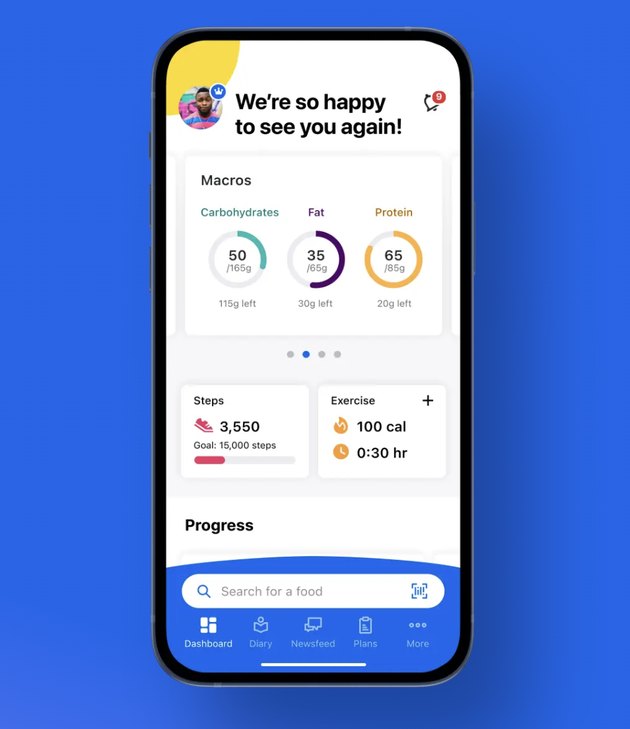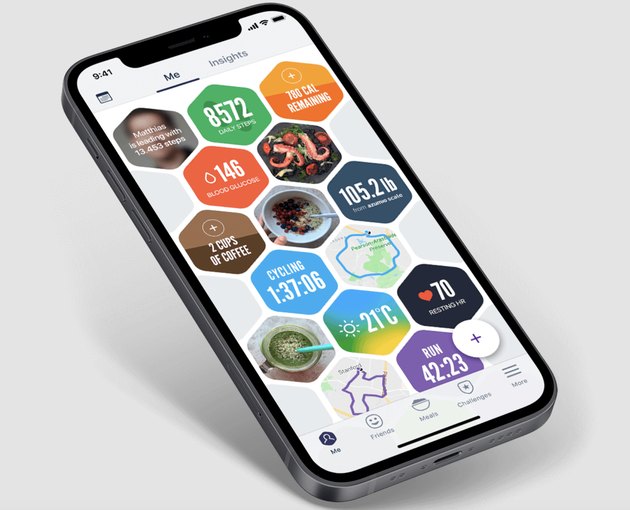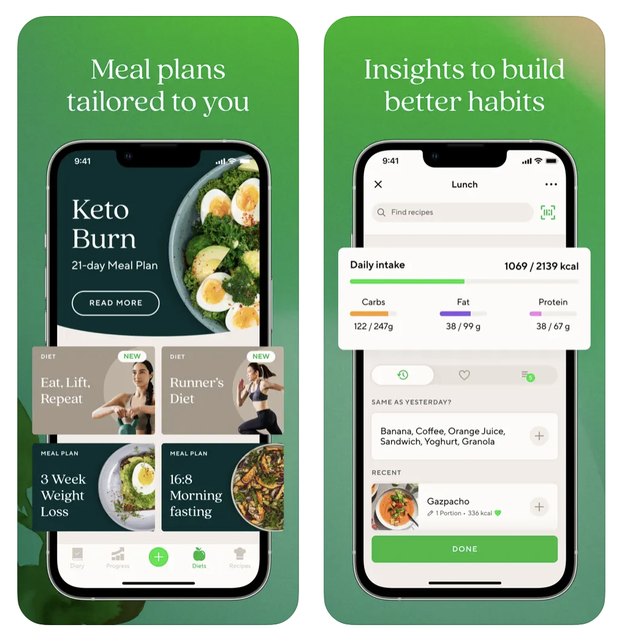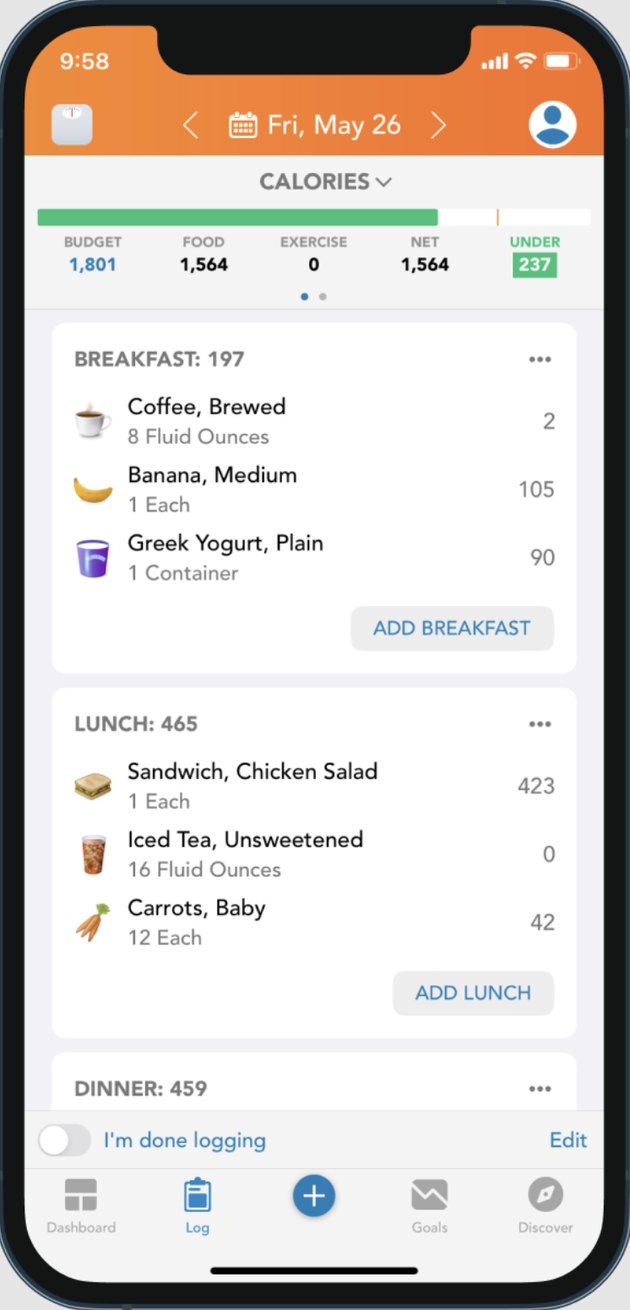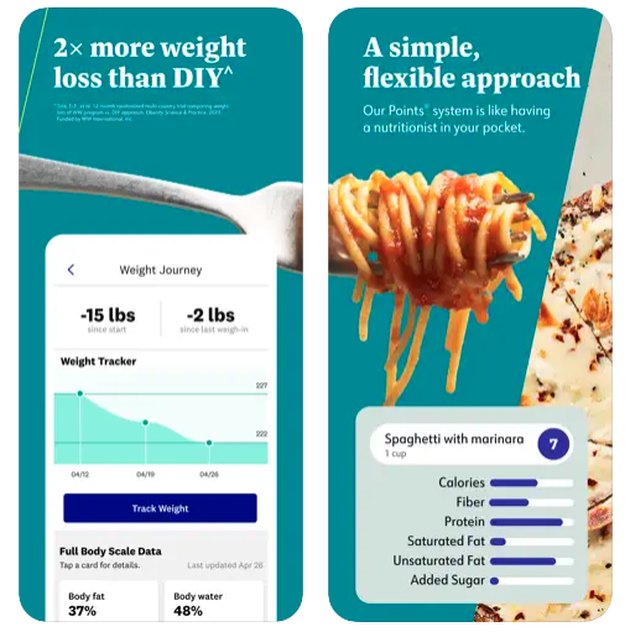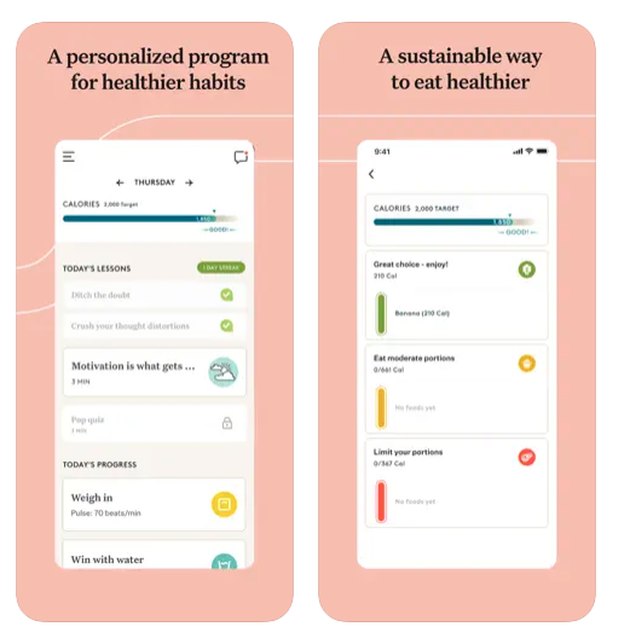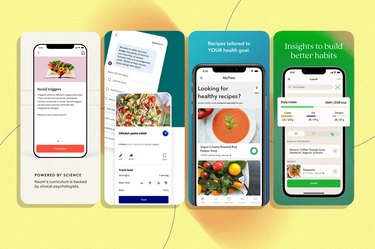
We know that eating nutritious foods can help us lose weight, along with being more physically active — but did you know the simple act of tracking what you're eating is linked to greater weight-loss success, too?
Research backs this up: Tracking daily food consumption with an app led to greater weight-loss success, per a February 2019 study in JMIR Mhealth Uhealth. But of course, to stick with the habit, you'll need an easy method.
Video of the Day
Video of the Day
That's where calorie-counting apps come in. Many of them allow you to note down your physical activity, sleep and other habits as well as monitoring calories. Here, we've rounded up six RD-recommended calorie-counting apps.
Best Free Calorie-Counter Apps
- Best Overall: My Fitness Pal
- Best for Fitness Focused Weight Loss: Argus
- Best for Specialized Diet Patterns: Lifesum
- Best for Fuss-Free Tracking: Lose It!
- Best for Food Freedom: WeightWatchers
- Best for Supportive Weight Loss: Noom
How We Chose
We tapped two nutrition experts — sports dietitian Marie Spano, RD, CDCS, and dietitian Andrea Goergen, RDN, LDN, owner of Cultivate Healthy in the Washington, DC, area — to get their opinions on some of the most popular calorie counting apps available.
We also looked at ratings and numbers of reviews. All of the apps recommended have 4.7 stars or higher and more than 30 thousand reviews on the Apple App Store. Finally, we looked for apps that will help support best practices for using a food diary, such as recording when you eat.
For more information on how we choose and cover products, click here.
1. MyFitnessPal
Pros
- Easy to use
- Large food database
- Ability to share
Cons
- Food database can be inaccurate
- Paid plan is pricey
- Barcode scanner is only available with paid version
MyFitnessPal is one of the most popular calorie tracking apps. Because of their early start and ongoing popularity, they have the "World's Largest Online Community," available to users 24/7. MyFitnessPal keeps their main offerings fairly streamlined: helpful articles, tracking and progress.
Spano loves MFP for its ease of use, but cautions that the calorie counts may be a little off: "The database includes a number of foods that are not accurate as they have been entered by other users." To avoid inaccurate calorie counts, look for entries with a check mark, Goergan says.
"With the free version," Goergan adds, "you can track food intake, create favorites, build recipes [and] import online recipes using URLs, which is rarely a free feature in other apps!" She also likes that this app will alert you if you're eating too few calories.
Other features we love:
- Large database of food: With over 14 million foods in their database, you are sure to find the exact food on your plate.
- Share your diary: You have the capabilities to download and save your diary and therefore, the ability to share it with your trainer or nutritionist.
- Timestamp your meals: With the premium subscription, you can timestamp your meals to ensure you're eating to meet your goals whether it's to eat every three hours or if you do intermittent fasting and have a feeding window.
- Different goals by day: The premium subscription also allows you to set different goals for each day so if you do intermittent fasting or perhaps you try to eat more on leg day, you can plan for that with this feature.
- Connects with many other apps: If you use other apps (like Fitbit, Apple HealthKit, Garmin, a walking app and so on), you can link your MyFitnessPal account.
2. Argus Calorie Counter & Step
Pros
- Easy to use
- Tracks water
- Fitness focused
Cons
- Smaller focus on nutrition
If fitness is one of your top goals with tracking calories, Argus may be a good choice for you. The Argus Calorie Counter & Step does all the basics — from tracking calorie intake to giving analysis based on inputs — but it also exceeds the norm. Case in point: How about monitoring your heart rate with the tip of your finger and your phone's camera, or using the 24/7 pedometer to measure your steps and caloric output?
The app also has a unique display made up of honeycomb-shaped tiles that bring your most pertinent data (coffee and water intake, calories consumed and burned, steps taken, etc.) to the forefront.
"Argus lets you track weight, water and sleep but not nutrition," Spano says. If you're solid in the nutrition department, then this might work for you.
Other features we love:
- Choose your goals: With three different goals — lose weight, build muscle or be more active — you can customize your progress.
- Sleep tracker: Track your sleep habits and use the company's proprietary algorithm to wake you up at your lightest stage of sleep — or in other words, make your morning wake-up call a little easier.
- Multi-activity GPS: Track running and cycling routes and even climbing, plus more. Note: Running the GPS in the background does wear down the battery time more quickly.
- Workouts: The app provides custom workouts to do in your own home. Upper body workouts come with the free app, and the premium service includes full access to all workouts.
- Barcode scanner: Not a novel feature, but it definitely adds ease in tracking your calories of packaged foods.
- Community and challenges: Invite your healthy and fit-to-be friends and family to join you on various challenges. Meditation challenge, anyone?
3. Lifesum
Pros
- Easy to use
- Built in dietary eating patterns
- Use food photos for tracking
- Paid option is inexpensive
Cons
- Calorie-intake recommendations may be inaccurate
Lifesum's one-of-a-kind design and intuitive, streamlined layout makes it effortless to use. Lifesum came out on top for ease of use in a May 2019 study in Journal of Medical Internet Research, that looked at usability among multiple calorie-counting apps. One of Lifesum's unique features is the recommended calorie ranges for each meal and snack. They act as a guide to help you navigate through the day from breakfast to dinner.
With a premium subscription to Lifesum, you'll be able to dig further into the nutrient composition of each individual food, including the types of fat, the breakdown between fiber and sugar, etc. Other features we love:
- Life Score: Each week you're given a score on your health based on your nutrition and exercise habits throughout the week.
- Jump-start program: The app includes a three-week weight-loss program to launch you on your way to your weight-loss goals.
- Specialized diet plans: There are several diet plans available — including emerging diet patterns such as Scandinavian.
- Healthy recipes: Hundreds of recipes are already built in making them easy to try and easy to track.
4. Lose It
Pros
- Easy to use
- Use food photos for tracking
- Barcode scanner with free version
Cons
- Only basic calorie tracking with free version
Lose It offers a unique dashboard with a view of the entire week, which helps you see the bigger picture and the importance of consistency. The free option is pretty straightforward with the ability to track meals, water, exercise and weight. It also breaks down meals by macros. Lose It also helps guide you on your way with suggested calorie intakes per meal. Other features we love:
- Track by photo: You can snap a picture of your food and an output of the nutritional information.
- Holistic goal setting: Lose It looks beyond just weight-loss goals, with the ability to set health, sleep, measurement, exercise, hydration and body fat goals.
- Weekly reports: You'll receive a weekly report with details on your food intake and progress.
- Search by brands and restaurant foods: If you're not big on making your meals or eating at home, the Lose It app has a feature to search for foods by their brands or restaurant name. Additionally, Lose It features the barcode scanner making it even easier with packaged foods.
It's free to download the following two apps, and both offer a free trial period so you can explore if they're a good fit for you. Once the trial is complete, however, there is a fee to use the plans.
5. WeightWatchers
Pros
- Easy to track
- Promotes nutritious eating
- Built in community support
- Ability to change plans
Cons
- Charged after 30-day trial
WW, which most people still refer to as Weight Watchers, is very well known in the weight-loss world. Like most tracking apps, your plan is personalized into one of three colors, which helps guide you in your points for each day.
Their large selection of Zeropoint foods (aka, "free" foods that you can eat anytime, without including them in your daily points' allotment) helps provide more freedom in the diet. Spano likes WW for promoting behavior change by assigning lower points to more nutritious foods and higher points to foods with less nutrient value.
- Zeropoints foods: There are more than 300 Zeropoint foods, which means you get the freedom to choose any of these foods at any time without deducting from your total point total. Lean proteins, fruits, vegetables, whole grains, low-fat yogurt and cottage cheese are all "free" foods.
- Flexible plans: If you don't like one plan, you have the option of switching to another, which allows you more food freedom and flexibility in your diet.
- Built-in community: When you join the app, you also get the benefits of the WW community and resources, including coaching and daily check-ins.
6. Noom
Pros
- Easy to use
- Ability to track more than calories
- Promotes behavior change, not just calories
Cons
- Short trial period
- Paid plan is pricey
- Daily weigh-ins
Research supports the effectiveness of the Noom app: A small study with 43 participants found that 64 percent of Noom users lost more than five percent of their body weight, according to results in a September 2016 in the BMJ Open Diabetes Research and Care.
Spano likes Noom for not just calorie counting, but the ease of tracking blood sugar, blood pressure and exercise. In addition, Noom promotes nutrient-rich foods, which is always a plus for supporting a healthy overall diet pattern, Spano says.
So why does it work? Noom is more focused on behavior change rather than just counting calories. This may be a hit or a miss depending on your personal goals. It's helpful that the tracking portion of the app is fairly streamlined. Noom also offers courses — for an additional fee — based on what your needs are.
Other features we love:
- Built-in cheerleader: Although the app is extremely streamlined, the free version includes daily inspirational quotes to keep you motivated.
- Personalization and hands-on support: With the paid version, you'll also receive a personalized health plan from a dedicated coach as well as 24/7 support and motivation.
- Novice-friendly: The app is very straightforward, making it a great option for those who may be new to tracking their meals, exercise and weight loss.
What to Look for Before Downloading
Always try out the free version of any app first before making the long-term commitment. This will ensure it does everything you need to support your goals.
You also want to ensure your foods are easy to input and that the apps accommodates the diet pattern that you choose. If you eat out a lot, make sure common menu items are included. If you cook at home, look for the option to input your own recipes.
Unless you find ads annoying, there is rarely a need to pay for a calorie-counting app, Goergen says. That said, along with removing ads, paid versions also often provide add-on features that can be beneficial.
No two apps are exactly the same, so be confident that there is one for you, just give yourself the time to find it.
- JAND: "Self-Monitoring and Eating-Related Behaviors are Associated with 12-Month Weight Loss in Postmenopausal Overweight-to-Obese Women."
- Journal of Medical Internet Research: "A Focused Review of Smartphone Diet-Tracking Apps: Usability, Functionality, Coherence With Behavior Change Theory, and Comparative Validity of Nutrient Intake and Energy Estimates"
- BMJ Open Diabetes Research and Care: "Weight Loss Efficacy of a Novel Mobile Diabetes Prevention Program Delivery Platform with Human Coaching"
- JMIR mHealth and uHealth: "Comparing Self-Monitoring Strategies for Weight Loss in a Smartphone App: Randomized Controlled Trial"
- Obesity: "Log Often, Lose More: Electronic Dietary Self-Monitoring for Weight Loss"
